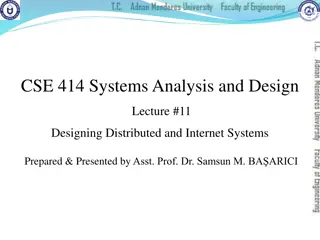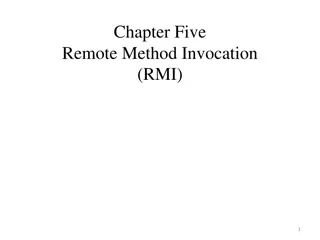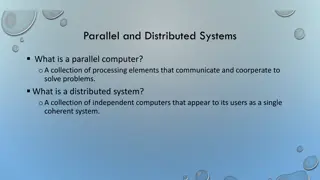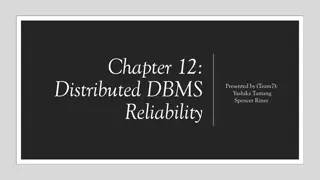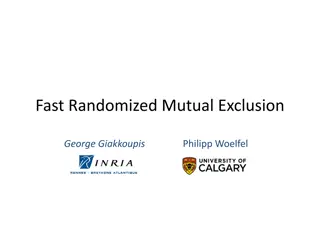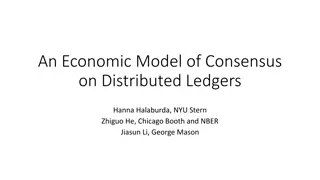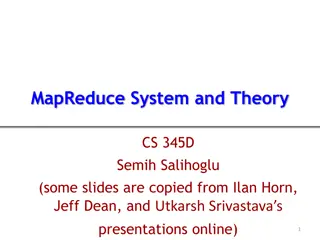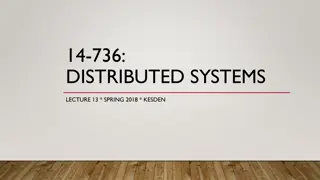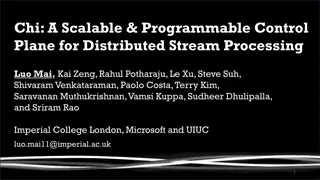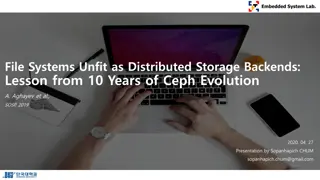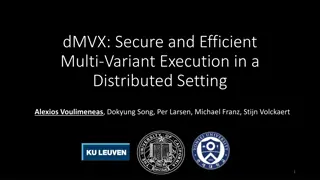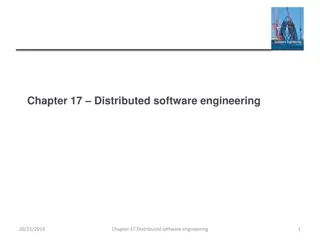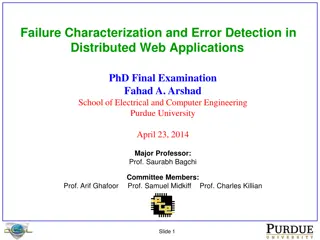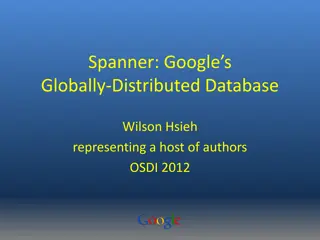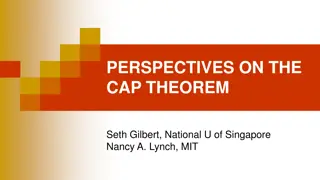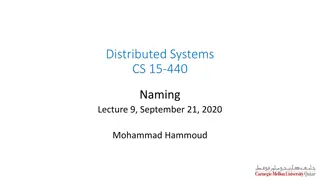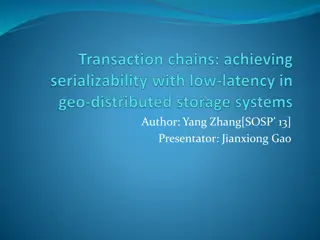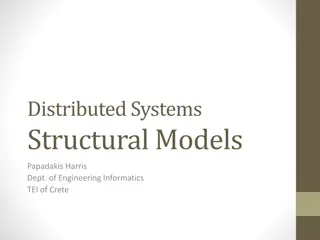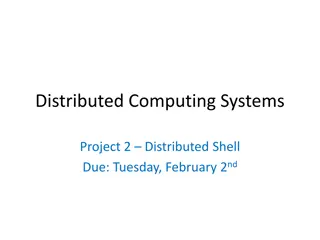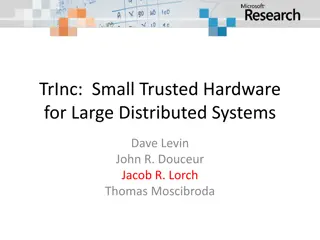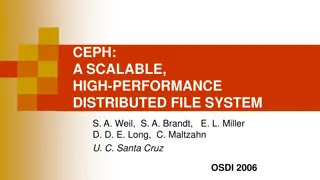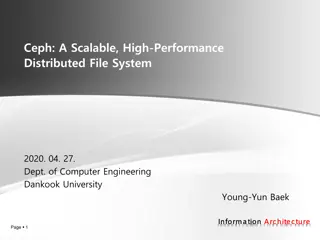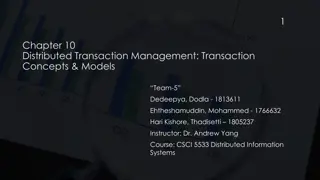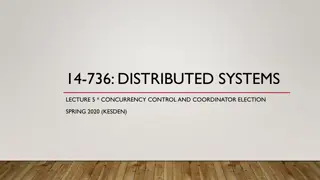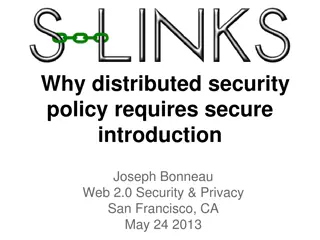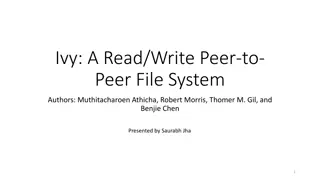Pest control in Kolkata
Are you looking for professional pest control services in Kolkata? Socspl.com is here to provide the most reliable and efficient pest control services in Kolkata. We have extensive knowledge and experience in handling all kinds of pest infestations such as termite control, cockroach control, ant con
1 views • 8 slides
Overview of Distributed Systems: Characteristics, Classification, Computation, Communication, and Fault Models
Characterizing Distributed Systems: Multiple autonomous computers with CPUs, memory, storage, and I/O paths, interconnected geographically, shared state, global invariants. Classifying Distributed Systems: Based on synchrony, communication medium, fault models like crash and Byzantine failures. Comp
9 views • 126 slides
Understanding Control Systems in Ergonomics Macro
Control systems play a vital role in regulating and managing various processes within different industries. This content delves into the fundamentals of control systems, discussing terms like input, output, plant, process, system, open-loop system, closed-loop system, transfer function, feedback con
7 views • 15 slides
Understanding CS 394B: Blockchain Systems and Distributed Consensus
This course, led by Assistant Professor Marco Canini, delves into the technical aspects of blockchain technologies, distributed consensus, and secure software engineering. Students will engage in flipped classroom-style classes and paper presentations, critiquing research papers, defending research
0 views • 65 slides
Understanding Parallel and Distributed Computing Systems
In parallel computing, processing elements collaborate to solve problems, while distributed systems appear as a single coherent system to users, made up of independent computers. Contemporary computing systems like mobile devices, IoT devices, and high-end gaming computers incorporate parallel and d
1 views • 11 slides
Designing Distributed and Internet Systems
Learn about the design considerations for distributed and internet systems, including file server versus client/server environments, cloud computing trends, internet standards, and system development life cycle. Explore designing systems for local area networks (LANs) and the process of creating dis
2 views • 51 slides
Understanding Remote Method Invocation (RMI) in Distributed Systems
A distributed system involves software components on different computers communicating through message passing to achieve common goals. Organized with middleware like RMI, it allows for interactions across heterogeneous networks. RMI facilitates building distributed Java systems by enabling method i
1 views • 47 slides
Understanding Remote Method Invocation (RMI) in Distributed Systems
A distributed system involves components on different computers communicating to achieve a common goal. Middleware, like RMI, helps organize these systems. RMI allows Java objects to invoke methods on remote objects, facilitating distributed Java systems. It differs from RPC by focusing on object-or
1 views • 47 slides
Understanding Parallel and Distributed Systems in Computing
A parallel computer is a collection of processing elements that collaborate to solve problems, while a distributed system comprises independent computers appearing as a single system. Contemporary computing systems, like mobile devices and cloud platforms, utilize parallel and distributed architectu
0 views • 11 slides
Distributed DBMS Reliability Concepts and Measures
Distributed DBMS reliability is crucial for ensuring continuous user request processing despite system failures. This chapter delves into fundamental definitions, fault classifications, and types of faults like hard and soft failures in distributed systems. Understanding reliability concepts helps i
0 views • 58 slides
Understanding Marketing Control and Its Importance in Business
Marketing control is a crucial process for firms to evaluate the impact of their marketing strategies and initiatives, making necessary adjustments for better outcomes. It involves various aspects such as annual plan control, profitability control, efficiency control, and strategic control. The proc
0 views • 20 slides
Understanding Control Plans in Process Management
A Control Plan is vital in controlling risks identified in the FMEA process, focusing on process and product characteristics, customer requirements, and establishing reaction plans for out-of-control conditions. It serves as a central document for communicating control methods and includes key infor
1 views • 20 slides
Overview of Mutual Exclusion and Memory Models in Distributed Systems
Discussion on fast, randomized mutual exclusion techniques by George Giakkoupis and Philipp Woelfel. Exploring asynchronous shared memory systems with atomic operations. Understanding mutual exclusion principles as outlined by Dijkstra in 1965 and measuring time efficiency in critical sections. Delv
2 views • 23 slides
Economic Models of Consensus on Distributed Ledgers in Blockchain Technology
This study delves into Byzantine Fault Tolerance (BFT) protocols in the realm of distributed ledgers, exploring the complexities of achieving consensus in trusted adversarial environments. The research examines the classic problem in computer science where distributed nodes communicate to reach agre
0 views • 34 slides
Distributed Algorithms for Leader Election in Anonymous Systems
Distributed algorithms play a crucial role in leader election within anonymous systems where nodes lack unique identifiers. The content discusses the challenges and impossibility results of deterministic leader election in such systems. It explains synchronous and asynchronous distributed algorithms
2 views • 11 slides
Understanding MapReduce System and Theory in CS 345D
Explore the fundamentals of MapReduce in this informative presentation that covers the history, challenges, and benefits of distributed systems like MapReduce/Hadoop, Pig, and Hive. Learn about the lower bounding communication cost model and how it optimizes algorithm for joins on MapReduce. Discove
0 views • 60 slides
Overview of Distributed Systems, RAID, Lustre, MogileFS, and HDFS
Distributed systems encompass a range of technologies aimed at improving storage efficiency and reliability. This includes RAID (Redundant Array of Inexpensive Disks) strategies such as RAID levels, Lustre Linux Cluster for high-performance clusters, MogileFS for fast content delivery, and HDFS (Had
0 views • 23 slides
Chi: A Scalable and Programmable Control Plane for Distributed Stream Processing
Distributed stream processing systems are increasingly crucial for various production use cases, such as real-time dashboards, machine learning, and interactive debugging. The challenges of handling large variability in production ingestion workloads and high-degree data skew in queries are addresse
1 views • 20 slides
Evolution of Ceph's Storage Backends: Lessons Learned
Embedded System Lab explores the challenges of building storage backends on local file systems, focusing on the evolution of Ceph's storage backend over a decade. The presentation delves into the complexities of distributed storage systems like Ceph, highlighting difficulties in leveraging efficient
0 views • 27 slides
Secure and Efficient Multi-Variant Execution in Distributed Settings
This paper discusses dMVX, a system for secure multi-variant execution in distributed settings to mitigate memory errors and protect against attacks. Using leader and follower variants, diversified program variants run in lockstep to ensure security. The system monitors and replicates I/O results, e
0 views • 35 slides
Wholesale Storage Load Metering of Losses in Distributed Generation Battery Facility
Example system configuration in ERCOT involving a wholesale storage load metering system to track losses in a distributed interconnected generation battery facility. The system includes electrical storage systems, generation resources, and distribution generation components. Challenges arise in dete
0 views • 8 slides
Distributed Software Engineering Overview
Distributed software engineering plays a crucial role in modern enterprise computing systems where large computer-based systems are distributed over multiple computers for improved performance, fault tolerance, and scalability. This involves resource sharing, openness, concurrency, and fault toleran
0 views • 66 slides
Challenges in Detecting and Characterizing Failures in Distributed Web Applications
The final examination presented by Fahad A. Arshad at Purdue University in 2014 delves into the complexities of failure characterization and error detection in distributed web applications. The presentation highlights the reasons behind failures, such as limited testing and high developer turnover r
0 views • 53 slides
Google Spanner: A Distributed Multiversion Database Overview
Represented at OSDI 2012 by Wilson Hsieh, Google Spanner is a globally distributed database system that offers general-purpose transactions and SQL query support. It features lock-free distributed read transactions, ensuring external consistency of distributed transactions. Spanner enables property
0 views • 27 slides
Understanding the CAP Theorem in Distributed Systems
The CAP Theorem, as discussed by Seth Gilbert and Nancy A. Lynch, highlights the tradeoffs between Consistency, Availability, and Partition Tolerance in distributed systems. It explains how a distributed service cannot provide all three aspects simultaneously, leading to practical compromises and re
0 views • 28 slides
Understanding Distributed Hash Table (DHT) in Distributed Systems
In this lecture, Mohammad Hammoud discusses the concept of Distributed Hash Tables (DHT) in distributed systems, focusing on key aspects such as classes of naming, Chord DHT, node entities, key resolution algorithms, and the key resolution process in Chord. The session covers various components of D
0 views • 35 slides
Communication Costs in Distributed Sparse Tensor Factorization on Multi-GPU Systems
This research paper presented an evaluation of communication costs for distributed sparse tensor factorization on multi-GPU systems. It discussed the background of tensors, tensor factorization methods like CP-ALS, and communication requirements in RefacTo. The motivation highlighted the dominance o
0 views • 34 slides
Distributed Database Management and Transactions Overview
Explore the world of distributed database management and transactions with a focus on topics such as geo-distributed nature, replication, isolation among transactions, transaction recovery, and low-latency maintenance. Understand concepts like serializability, hops, and sequence number vectors in ma
0 views • 17 slides
Understanding Client-Server Paradigm in Distributed Systems
Client-server paradigm in distributed systems involves structuring systems as collaborating processes where clients request services from servers. The model follows a request/reply protocol, with servers providing centralized control of shared resources. Advantages include security and simplicity, w
1 views • 30 slides
Distributed Computing Systems Project: Distributed Shell Implementation
Explore the concept of a Distributed Shell in the realm of distributed computing systems, where commands can be executed on remote machines with results returned to users. The project involves building a client-server setup for a Distributed Shell, incorporating functionalities like authentication,
0 views • 14 slides
TrInc: Small Trusted Hardware for Large Distributed Systems
TrInc is a system designed to provide trusted hardware for large distributed systems, aiming to prevent equivocation, ensure trust in distributed systems, and enhance security through various applications and features. Developed by Jacob R. Lorch and team, TrInc offers solutions such as BFT with few
0 views • 62 slides
Overview of Ceph Distributed File System
Ceph is a scalable, high-performance distributed file system designed for excellent performance, reliability, and scalability in very large systems. It employs innovative strategies like distributed dynamic metadata management, pseudo-random data distribution, and decoupling data and metadata tasks
0 views • 42 slides
Overview of Ceph: A Scalable Distributed File System
Ceph is a high-performance distributed file system known for its excellent performance, reliability, and scalability. It decouples metadata and data operations, leverages OSD intelligence for complexity distribution, and utilizes adaptive metadata cluster architecture. Ceph ensures the separation of
0 views • 23 slides
Understanding Git: An Overview of Version Control Systems
Git is a powerful version control system that facilitates collaborative work and maintains a comprehensive history of project changes. It offers both Centralized and Decentralized/Distributed systems, with advantages and drawbacks for each. Centralized systems rely on a central server for collaborat
0 views • 37 slides
Distributed Transaction Management in CSCI 5533 Course
Exploring transaction concepts and models in distributed systems, Team 5 comprising Dedeepya, Dodla, Ehtheshamuddin, and Hari Kishore under the guidance of Dr. Andrew Yang delve into the intricacies of distributed transaction management in CSCI 5533 Distributed Information Systems.
0 views • 56 slides
Concurrency Control and Coordinator Election in Distributed Systems
This content delves into the key concepts of concurrency control and coordinator election in distributed systems. It covers classical concurrency control mechanisms like Semaphores, Mutexes, and Monitors, and explores the challenges and goals of distributed mutual exclusion. Various approaches such
0 views • 48 slides
Quantum Distributed Proofs for Replicated Data
This research explores Quantum Distributed Computing protocols for tasks like leader election, Byzantine agreement, and more. It introduces Quantum dMA protocols for verifying equality of replicated data on a network without shared randomness. The study discusses the need for efficient protocols wit
0 views • 28 slides
The Necessity of Secure Distributed Security Policies
The presentation by Joseph Bonneau at the Web 2.0 Security & Privacy event in San Francisco delved into the importance of secure distributed security policies. Addressing threats, cryptographic attacks on HTTPS, vulnerabilities in practice, control aspects, HTTPS stripping, and rogue certificates, t
0 views • 34 slides
Ivy: A Read/Write Peer-to-Peer File System Overview
Introduction to Ivy, a read/write peer-to-peer file system designed to enable easy storage and access of remote files in a distributed manner. The presentation covers the motivation for peer-to-peer distributed file systems, challenges in designing such systems, and how Ivy addresses trust issues an
0 views • 17 slides
Understanding Control Plans in Process Management
Control plans are essential tools for managing process risks and ensuring quality control. They focus on controlling process and product characteristics, meeting customer requirements, and having reaction plans in place. A control plan contains key information such as control factors, specifications
0 views • 20 slides





